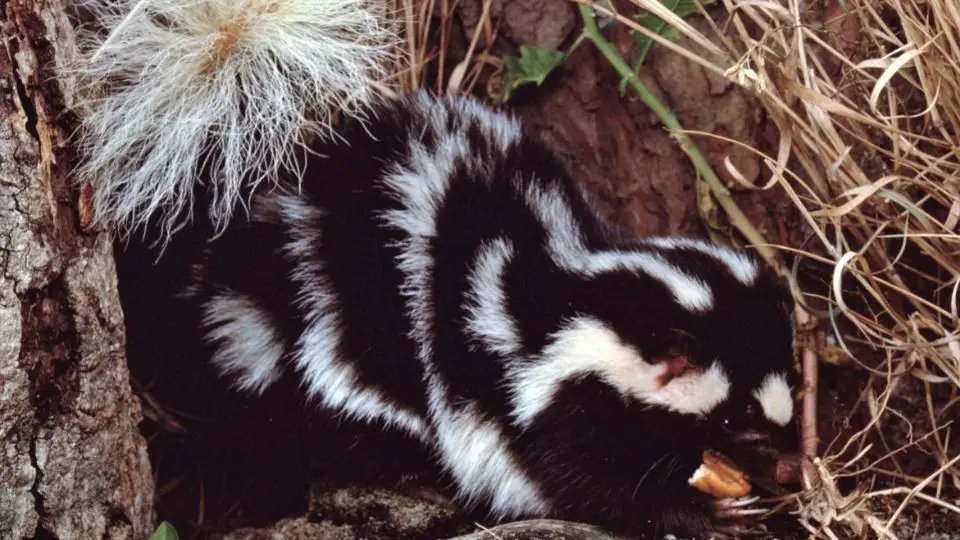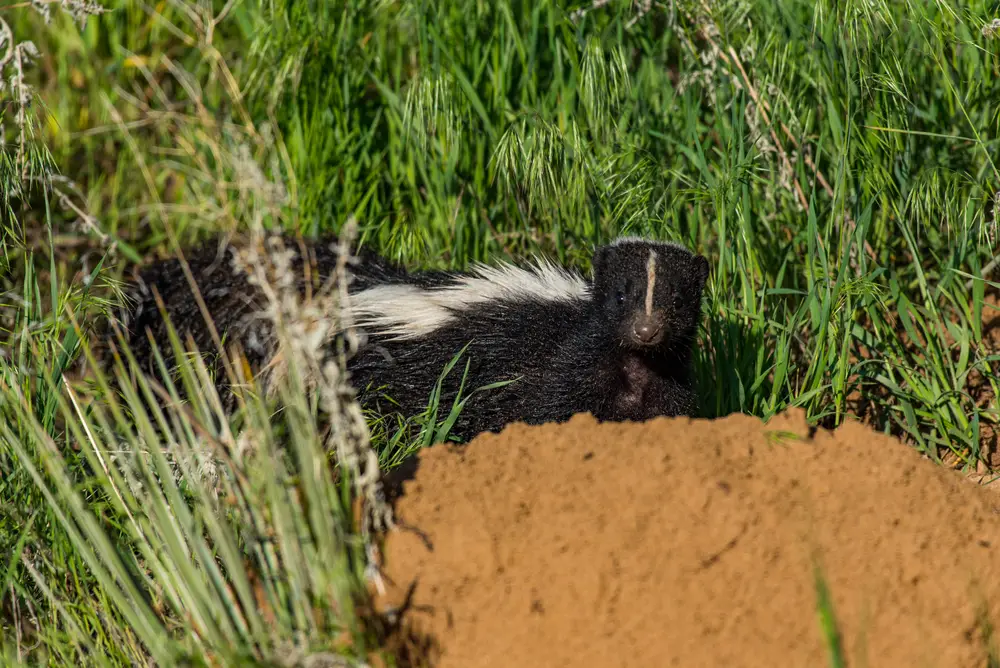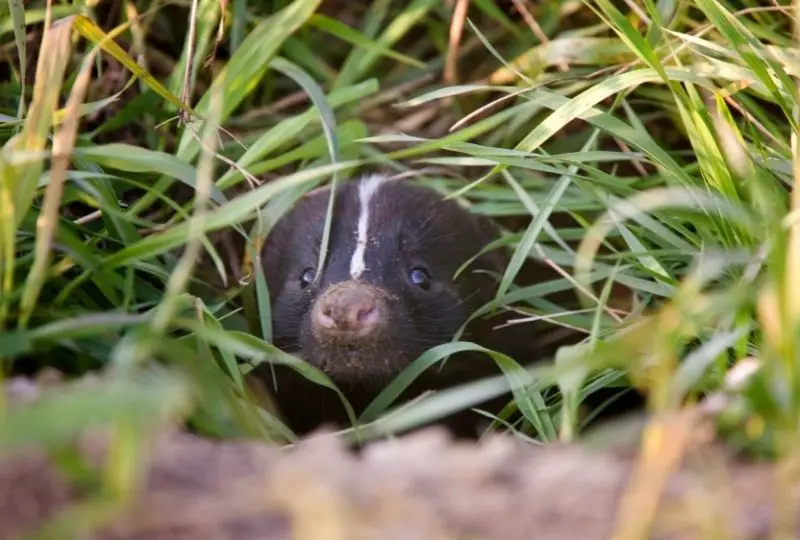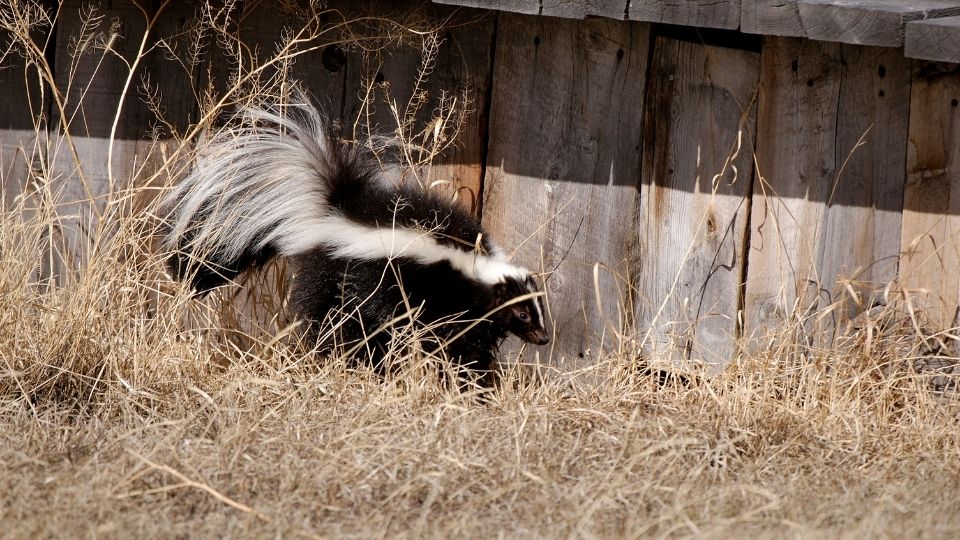With their sharp, long claws, some species of skunks are excellent climbers and can scale a fence up to 6 feet high. The spotted skunk is the greatest climber among all other skunk species. They have pads beneath their feet that allow them to climb various fencing materials like wire mesh, chicken wire, and chain link fences.
However, most other species, such as the striped skunk and hog-nosed skunk, are not as good at climbing and may only be able to scale a shorter fence. They may opt to burrow underground or look for other entryways instead.
If you have a striped furry critter roaming around your fenced property, they may have climbed your fence or dug underground. If you can’t find any signs of disturbed soil or underground burrows, your best bet is to inspect the fence for any gaps, holes, or loose boards that a skunk could squeeze through.
Should you rule out those signs, too, it’s likely that the skunk climbed the fence to enter your home.

Table of Contents
Can a skunk climb a wall or a fence?
Skunks particularly spotted skunks, are capable of scaling fences with their snouts and sharp claws. They can’t climb walls that are too high, 10 feet and above, or too smooth like concrete.
However, take note if there’s an object that acts as a ladder near the top of the fence, such as a tree branch or a pile of stones. Skunks can use these to climb over your fence.
The main reason why skunks climb fences is to find food or shelter. In urban areas, skunks often look for food in trash cans or pet food bowls left outside.
If you find that your trash cans or pet food bowls have been overturned and have noticed an unpleasant odor wafting in the air, a skunk was likely the culprit. Spotted skunks would likely return to forage again if your land is an open area rich in food sources like slugs, wasps, and crickets.
If you find a nest of baby skunks on your property, it’s best to call a skunk removal company to have them safely removed.
Sometimes, a skunk may also make a nest under your shed, basements, or porch to nurse its newborns. This typically occurs during the summer season between May to July.
Can skunks jump over fences?
No, skunks cannot jump over tall fences. They are not built for jumping like rabbits or squirrels, and their hind legs, while powerful, are too short to give them a good boost.
The maximum height a skunk can jump is around 3 feet, which a good fence can easily deter. For reference, an average housecat can jump about 5 to 6 feet.
A skunk can only get over a fence by climbing it or going under it. If there’s a makeshift ladder near the top of the fence that a skunk can use to climb over, they may take advantage of it and jump a shorter distance.
Otherwise, most species will try to burrow under your land to enter the premises.

What deters skunks from your yard?
If your fence isn’t high enough or has gaps that a skunk could squeeze through, you may want to consider making some changes to your property to deter skunks from entering it.
Here are the best methods to keep skunks away:
Metal Sheeting
Place smooth metal sheets around your fence.
About one to two feet of the metal sheet should extend from the ground, curving outwards. This will make it quite difficult for skunks to climb over or dig under your fence.
Ultrasonic Repeller
Use ultrasonic devices. These devices emit high-frequency sounds that deter animals like skunks from entering your property.
Ammonia
Place ammonia-soaked rags at the property edges. The pungent smell of ammonia is off-putting to skunks and will deter them from entering your yard.
Water Sprinklers
Install a motion-activated sprinkler: The sudden noise and movement of the sprinkler will startle skunks and keep them away.
Garbage Cans
Seal garbage cans. If you have trash cans outside, seal the bags tightly so that skunks and raccoons can’t sniff out any food.
Pet Food
Keep pet food indoors. If you have pet food bowls outside, bring them inside at night so that skunks can’t access them.
Chemical & DIY Repellent
Spray skunk repellent. You can buy skunk repellant at your local hardware store. Follow the instructions on the bottle and spray it around your property.
Use DIY ingredients to repel skunks: Citrus rinds, vinegar, and cayenne pepper are all effective skunk deterrents.

If you’re dealing with a pesky skunk problem, contact a professional wildlife control company for help. They will be able to safely remove the skunks from your property and prevent them from coming back to your property for good.

